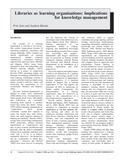| dc.contributor.author | Jain, P. | |
| dc.contributor.author | Mutula, S. | |
| dc.date.accessioned | 2011-03-15T09:44:05Z | |
| dc.date.available | 2011-03-15T09:44:05Z | |
| dc.date.issued | 2008 | |
| dc.identifier.citation | Jain, P. & Mutula, S. (2008) Libraries as learning organisations: implications for knowledge management, Library Hi Tech News, No. 8, pp. 10-14 | en_US |
| dc.identifier.issn | 0741-9058 | |
| dc.identifier.uri | http://hdl.handle.net/10311/751 | |
| dc.description.abstract | The concept of a learning
organisation is relevant to all twenty-first century organisations because of
increasing complexity, uncertainty and
change (Malhotra, 1996). Libraries can
benefit significantly as learning
organisations through reducing
complacency; continuous learning,
improvement and innovation (Michael
and Higgins, 2002); being better
equipped to deal with independent and
distance learning (Brophy, 2005);
serving as a source of competition
(Fowler, 1998); promoting inquiry and dialogue; encouraging collaboration and
team learning; establishing systems to capture and share learning; empowering people toward a collective vision; and
connecting the organisation to its
environment (Watkins and Marsick,1993). | en_US |
| dc.language.iso | en | en_US |
| dc.publisher | Emerald | en_US |
| dc.subject | Libraries | en_US |
| dc.subject | Learning organisations | en_US |
| dc.subject | Knowledge management | en_US |
| dc.title | Libraries as learning organisations: implications for knowledge management | en_US |
| dc.type | Published Article | en_US |

